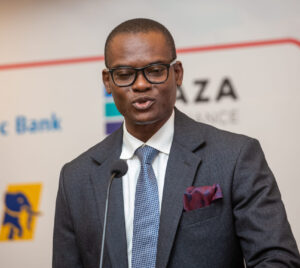The Managing Director-Ghana Stock Exchange (GSE), Abena Amoah, has highlighted the importance of collaboration among stakeholders in constructing a strong financial system for sustainable economic growth.
Speaking at The Money Summit 2023, under the theme ‘Africa’s robust financial sector: The catalyst for sustainable economic growth’, Ms. Amoah emphasised the urgent need to foster a culture of transparency, integrity and accountability among governments, regulatory bodies, financial institutions, private sector entities and civil society.
The summit sought to address the pressing need for collective efforts to overcome the current challenges and financial difficulties faced by the country.
“By strengthening governance frameworks, enhancing risk management systems and promoting ethical behaviour, we can establish a financial ecosystem that commands trust and attracts investment,” she stated; adding that creating a healthy ecosystem of banks, capital markets, insurance companies, pension funds and other financial institutions is vital in creating an environment conducive for growth, innovation and shared prosperity.
Ms. Amoah outlined five key areas wherein a robust financial system can drive sustainable economic growth in Africa. The first area is mobilising capital, which is crucial for entrepreneurs, businesses and infrastructure development.
Enhancing financial inclusion was the second key area highlighted by Ms. Amoah. She emphasised the need to ensure equal access to financial services for all individuals, particularly women and marginalised communities. By promoting financial inclusion through innovative technologies and inclusive policies, the formal economy can be made more accessible; thus stimulating consumption and driving economic growth from the grassroots up.
The third area of focus was promoting trade and investment. Africa possesses significant potential for intra-continental trade and foreign investments. A robust financial system plays a crucial role in facilitating cross-border transactions, mitigating risks and providing necessary financial instruments. Ms. Amoah highlighted initiatives such as the African Continental Free Trade Area (AfCFTA) as platforms for collaboration and integration, enabling businesses to tap into a vast market comprising 55 countries, a population of 1.3 billion people and a combined GDP of approximately US$3.4trillion.
The fourth area emphasised was fostering innovation. A well-functioning financial system provides a nurturing environment for innovation and technological advancement. Ms. Amoah highlighted the growth of fintech companies, digital infrastructure development and the adoption of emerging technologies as ways to drive financial inclusion, improve efficiency and unlock new avenues for economic expansion.
Finally, Ms. Amoah underscored the importance of promoting sustainable finance as the fifth key area. She emphasised the need to address environmental and social challenges for long-term economic sustainability. By promoting responsible investing, ethical banking practices and integrating Environmental, Social and Governance (ESG) considerations, a more sustainable and resilient economy can be created to benefit present and future generations.
The Ghana Stock Exchange has already taken significant steps toward promoting sustainable finance. In 2022, the GSE became a United Nations Sustainable Stock Exchange member; established a sustainable market segment; launched green and sustainable bond rules; and introduced ESG reporting guidelines.
In his opening remarks, Dr. Godwin Acquaye, Chief Executive Officer-Business and Financial Times (B&FT), highlighted the The Money Summit’s purpose: “The Money Summit seeks to enhance investor confidence and bring together actors in the financial sector to provide solutions that will anchor investor confidence in the economy and ease the hardships faced by businesses and the average Ghanaian”.’

Dr. Acquaye acknowledged challenges faced by the financial sector globally, which have also impacted Ghana’s economy. He mentioned factors such as inflation, high lending rates and the recent debt exchange programme, which have tested the country’s economic resilience. However, he expressed optimism about the opportunity for Ghanaians to unite and build a robust and resilient economy through technology, finance, investment, trade and entrepreneurship.
The Money Summit provided a platform for stakeholders from various sectors to come together and discuss strategies to overcome challenges and capitalise on opportunities in the financial sector. Collaborative efforts among governments, regulatory bodies, financial institutions, private sector entities and civil society were emphasised as essential for building a robust financial system that drives sustainable economic growth.
The event witnessed lively discussions and presentations on topics such as capital mobilisation, financial inclusion, trade and investment, innovation and sustainable finance. Participants engaged in interactive sessions, sharing insights, experiences and best practices to shape the financial landscape’s future.
The summit also highlighted the significance of regional integration and collaboration initiatives such as the African Exchanges Linkage Project (AELP), and partnerships between organisations like the African Securities Exchanges Association (ASEA) and Pan-African Payments and Settlement System (PAPSS). These collaborations aim to break down barriers, facilitate cross-border transactions, increase liquidity and deepen financial markets across the continent.










